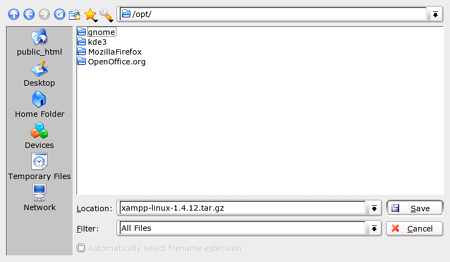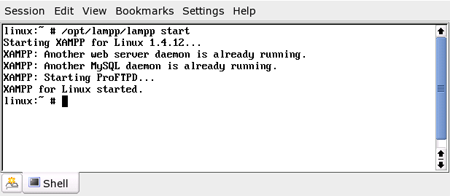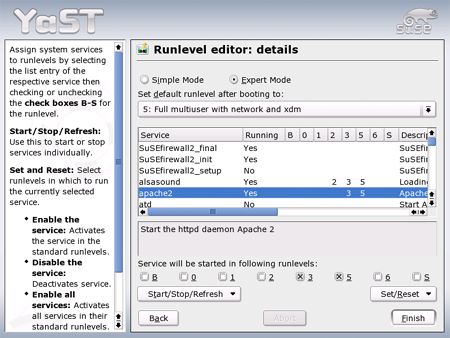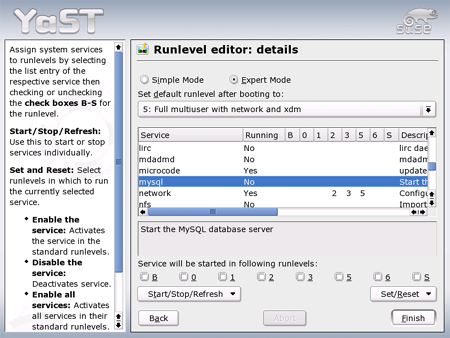Posted: 28 Mar 2005
XAMPP
The Linux gods must have recognized that my dues were paid because they
tipped me off to a wonderful project named XAMPP. This project,
started by a group called Apache Friends, provides a
package of applications[1]
that can be downloaded to a directory on your server, run without changing any
of the already installed packages, and easily deleted. Sounds just like what the
Dr. ordered.
The XAMPP instructions are clear and easy to follow. They also include a few
configuration options (like how to start Apache without MySQL and how to switch
back and forth between PHP 4 and 5) that I won't cover here. I will touch on a
bump or two that I encountered but aren't mentioned in the docs.
quick install
- Download the file from http://www.apachefriends.org/en/xampp-linux.html#374
- Go to a Linux shell and log in as the system administrator root:
su
- Extract the downloaded archive file to /opt:
tar xvfz xampp-linux-1.4.12.tar.gz -C /opt
- To start XAMPP simply call this command:
/opt/lampp/lampp start
- Test the installation by opening a browser and launching http://localhost
- To stop XAMPP simply call this command:
/opt/lampp/lampp stop
- To delete the packages, simply remove the /opt/lampp directory by issuing
this command:
rm -rf /opt/lampp
install for guys like me
- Download the file from http://www.apachefriends.org/en/xampp-linux.html#374
(I downloaded to the /opt directory so I wouldn't have to move the files
later.)

- I used KDE to help me extract the files (Right-click on archive ->
Actions -> Extract Here). By the way, the files extract into a directory
named "/lampp/" which, according to the Apache Friends site, used to be the
project name. It was changed to avoid confusion with other similarly-named
projects.

- I did go to the command line, er, shell, to type in the start command:

- This message reminded me that I was already running Apache and MySQL. I
would need to stop those processes before I could play with the newer ones.

- To (temporarily) stop my production copy of Apache I, a) launched YAST, b)
clicked the system icon in the left pane, c) clicked the Runlevel Editor icon
in the right pane, d) in the window that opened, clicked the "Expert Mode"
radio button, e) highlighted "apache2" in the scrolling list, f) selected
"Disable the service" from the "Set/Reset" dropdown in the lower right corner,
g) Selected "Stop now ..." from the "Start/Stop/Refresh" dropdown in the lower
left.

- I followed similar steps to (temporarily) shut down my production copy of
MySQL with the exception of choosing "mysql" in step "e".

- This time, when I went to the shell and typed the start command, XAMPP
started up as advertised.

- When you open a browser and go to http://localhost, you are redirected to
the XAMPP main page. A good place to start exploring the features of what
you've just installed is to click a language and then click the tool links in
the left pane of the target page.

- To stop XAMPP simply call this command:
/opt/lampp/lampp stop
- To delete the packages, log in as root, browse to /opt, right-click on the
"lampp" directory and select delete from the dropdown.
- Don't forget to go back into the Runlevel editor and start up your legacy
copies of Apache and MySQL when you're finished.
As you can tell, I'm still pretty new at this. But I'm learning ... and
having a lot of fun. If you have suggestions about what I've done or what I
should have done, drop me a
line.
applications currently included with xampp
- Apache 2.0.53
- MySQL 4.1.10
- PHP 5.0.3 & 4.3.10 & PEAR + SQLite 2.8.9/2.8.14 + multibyte
(mbstring) support
- Perl 5.8.6
- ProFTPD 1.2.10
- phpMyAdmin 2.6.1
- OpenSSL 0.9.7d
- GD 2.0.1
- Freetype2 2.1.7
- libjpeg 6b
- libpng 1.2.7
- gdbm 1.8.0
- zlib 1.1.4
- expat 1.2
- Sablotron 1.0
- libxml 2.4.26
- Ming 0.2a
- Webalizer 2.01
- pdf class 009e
- ncurses 5.8
- mod_perl 2.0.0-RC4
- FreeTDS 0.62.4
- gettext 0.11.5
- IMAP C-Client 2002b
- OpenLDAP (client) 2.2.13
- mcrypt 2.5.7
- mhash 0.8.18
- eAccelerator 0.9.2a
- cURL 7.10.7
- libxslt 1.1.8
- phpSQLiteAdmin 0.2
- libapreq 2.04-dev
|